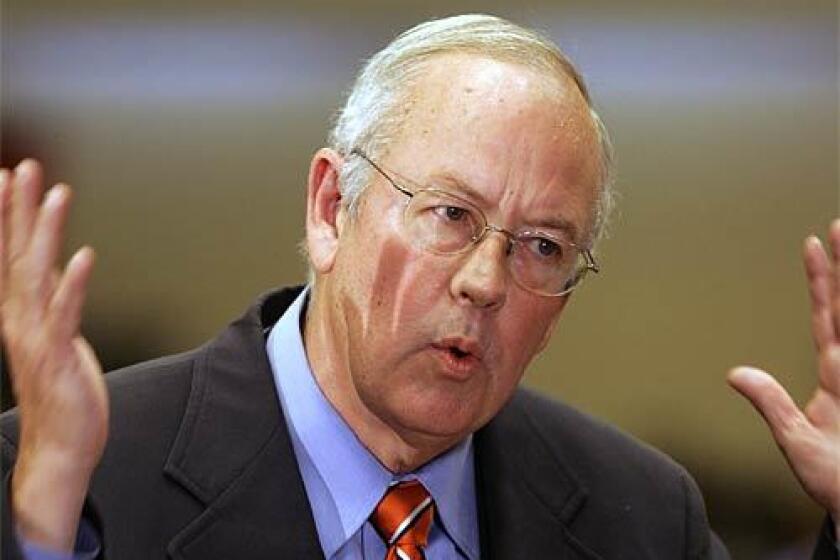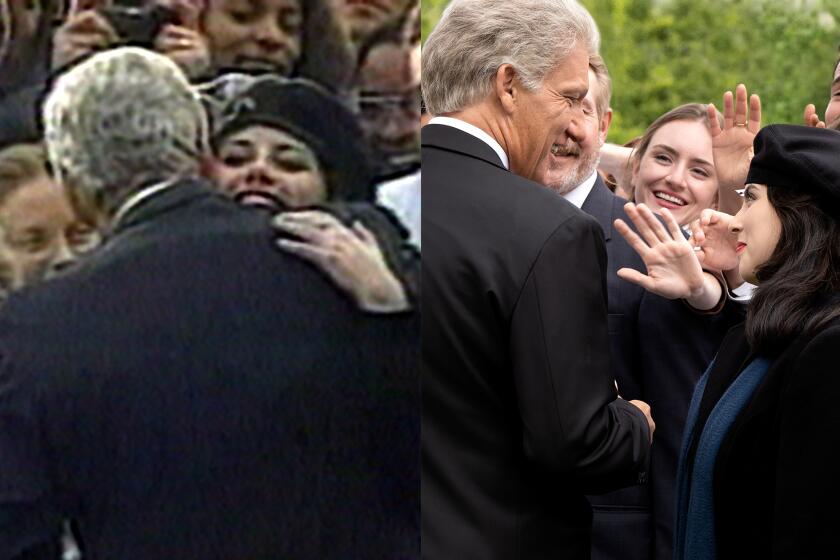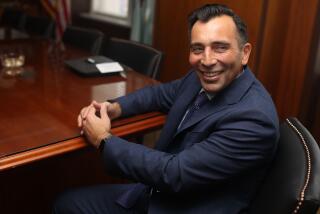Ken Starr dies; led investigation into President Clinton, defended Trump in impeachment trial

A former U.S. appellate judge and attorney whose criminal investigation of Clinton led to the president’s impeachment, has died, his family said.
- Share via
Ken Starr, a former federal appellate judge and prominent attorney whose criminal investigation of Bill Clinton led to the president’s impeachment, died Tuesday at 76, his family said.
Starr died Tuesday at a hospital of complications from surgery, according to a former colleague, attorney Mark Lanier. He said Starr had been in an intensive care unit in Houston for about four months.
In 2020, Starr was recruited to the legal team representing President Trump in his first impeachment trial.
For many years, his stellar reputation as a lawyer seemed to place him on a path to the Supreme Court. At age 37, he became the youngest person ever to serve on the U.S. Court of Appeals for the District of Columbia Circuit, where Chief Justice John G. Roberts Jr., Justice Clarence Thomas and the late justices Antonin Scalia and Ruth Bader Ginsburg also had served. From 1989 to 1993, Starr was the solicitor general in the administration of President George H.W. Bush, arguing 25 cases before the Supreme Court.
Despite his impressive legal credentials, nothing could have prepared him for the task of investigating a sitting president.
In a probe that lasted five years, Starr looked into fraudulent real estate deals involving a longtime Clinton associate, delved into the removal of documents from the office of Deputy White House Counsel Vincent Foster after his 1993 suicide and assembled evidence of Clinton’s sexual encounters with Monica Lewinsky, a former White House intern. Each of the controversies held the potential to do serious, perhaps fatal, damage to Clinton’s presidency.
Kenneth Starr, who oversaw the GOP impeachment drive against President Clinton two decades ago, is joining President Trump’s legal defense team.
As Clinton’s legal problems worsened, the White House pilloried Starr as a right-wing fanatic doing the bidding of Republicans bent on destroying the president.
“The assaults took a toll” on the investigation, Starr told a Senate committee in 1999. “A duly authorized federal law enforcement investigation came to be characterized as yet another political game. Law became politics by other means.”
In a bitter finish to his investigation of the Lewinsky affair that engendered still more criticism, Starr filed a report, as the law required, with the U.S. House of Representatives. He concluded that Clinton lied under oath, engaged in obstruction of justice and followed a pattern of conduct that was inconsistent with the president’s constitutional duty to faithfully execute the laws.
House Republicans used Starr’s report as a road map in the impeachment of the president, who was acquitted in a Senate trial.
In 2020, Starr was recruited to help represent Trump in his first impeachment trial. In a memorable statement to Congress during the trial, Starr said, “We are living in what I think can aptly be described as the ‘age of impeachment.’” He said that “like war, impeachment is hell, or at least, presidential impeachment is hell.”
Law: The report ends a costly, lengthy inquiry of the Clintons. The outside counsel says no charges will be filed but calls allegations ‘credible.’
Clinton’s legal problems began during the 1992 presidential campaign. Questions arose over the candidate’s ties to the owner of a failed Arkansas savings and loan. The issue faded quickly. But it caught the attention of federal regulators, who began looking into whether money from the S&L had been diverted to a real estate venture called Whitewater in which Bill and Hillary Clinton and the S&L’s owner, Jim McDougal, shared a financial interest.
Bowing to intense political pressure from Republicans and some members of his own party, Clinton called for the appointment of a special counsel to investigate Whitewater. A three-member appeals court for independent counsels selected Starr.
Episode 2 of “American Crime Story” depicts the beginning of Lewinsky’s sexual relationship with President Clinton. We separate fact from fiction.
On the Whitewater front, Starr’s prosecutors investigated Hillary Clinton’s legal work for McDougal’s S&L. Both she and the president were questioned by Starr’s prosecutors, and their videotaped depositions were played for juries in criminal trials of McDougal and his ex-wife, Susan. Neither of the Clintons was charged in connection with Whitewater.
The investigation of President Clinton’s intimate relationship with Lewinsky was a Washington spectacle.
In 1995, Lewinsky went to work at the White House as an intern. During the government shutdown late that year, she and Clinton had a sexual encounter in a hallway near the Oval Office, the first of 10 sexual encounters over the next year and a half. Lewinsky confided the affair to a co-worker, Linda Tripp, who recorded some of their conversations and brought the tapes to Starr’s prosecutors. Lewinsky was granted immunity from prosecution and became Starr’s chief witness against the president, who had denied having sexual relations with the intern.
Kenneth Starr to leave Pepperdine to become president of Baylor University
Putting the investigation behind him, Starr embarked on a career in academia, first as dean of the law school at Pepperdine University, where he taught constitutional issues and civil procedures, then as president of Baylor University in his home state of Texas. He also became an author, writing “First Among Equals: The Supreme Court in American Life.”
Born in Vernon, Texas, and raised in San Antonio, Starr earned his bachelor’s degree from George Washington University in 1968, his master’s from Brown University in 1969 and his J.D. from Duke University Law School in 1973. He was a law clerk to Chief Justice Warren E. Burger from 1975 to 1977.
As a young attorney at Gibson, Dunn & Crutcher in Los Angeles, Starr worked with William French Smith, who became attorney general in the administration of President Reagan. Starr became counselor to Smith and, from there, was nominated by Reagan to the federal appeals court.
Starr is survived by his wife of 52 years, Alice Mendell Starr; children Randall P. Starr, Carolyn S. Doolittle and Cynthia S. Roemer; and nine grandchildren.
A Times staff writer contributed to this story.
More to Read
Start your day right
Sign up for Essential California for the L.A. Times biggest news, features and recommendations in your inbox six days a week.
You may occasionally receive promotional content from the Los Angeles Times.









